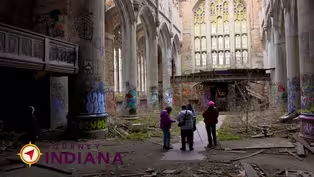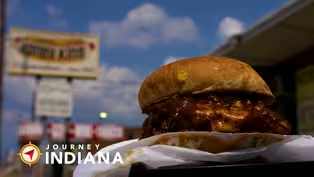Journey Indiana
The Mayor and the Movement : Gary Mayor Richard Hatcher Was the First-Elected Black Mayor of a Major US City
Clip: Season 7 Episode 6 | 9m 49sVideo has Closed Captions
Learn about former Gary, Indiana, Mayor Richard Hatcher.
Historical profile of former Gary, Indiana, Mayor Richard Hatcher - civil rights leader and first-elected Black Mayor of a major American city
Problems playing video? | Closed Captioning Feedback
Problems playing video? | Closed Captioning Feedback
Journey Indiana is a local public television program presented by WTIU PBS
Journey Indiana
The Mayor and the Movement : Gary Mayor Richard Hatcher Was the First-Elected Black Mayor of a Major US City
Clip: Season 7 Episode 6 | 9m 49sVideo has Closed Captions
Historical profile of former Gary, Indiana, Mayor Richard Hatcher - civil rights leader and first-elected Black Mayor of a major American city
Problems playing video? | Closed Captioning Feedback
How to Watch Journey Indiana
Journey Indiana is available to stream on pbs.org and the free PBS App, available on iPhone, Apple TV, Android TV, Android smartphones, Amazon Fire TV, Amazon Fire Tablet, Roku, Samsung Smart TV, and Vizio.
Providing Support for PBS.org
Learn Moreabout PBS online sponsorship♪ >> Mayor Hatcher is one of the first African American mayors of a major city in the United States, and it's significant because he was able to politicize the Black agenda at the height of Black Power and take a smaller city like Gary and make it a political player in the national arena.
♪ Lift him up ♪ Lift him up >> In the 1960s, a new generation of leaders was emerging in the U.S. Civil Rights movement.
During this era, Americans would discover a powerful path forward to greater racial equity through the vision of a soft-spoken attorney from Gary, Indiana, Richard Hatcher.
>> It wasn't just Civil Rights for Black people for him.
It was Civil Rights for everyone.
Whatever it was, that was going to help us move forward, that's what he was there for.
♪ Lift him up ♪ Lift him up ♪ Lift him up ♪ ♪ Lift him up ♪ >> Richard Gordon Hatcher was born in 1933 in Michigan City, Indiana.
The son of a Georgia sharecropper, and one of 13 children.
>> He grew up very poor, very poor.
He's the one that kind of got out of that poverty cycle.
Especially his father was a sharecropper in Georgia, and so he was kind of first generation out of the sharecropper slave hold that so many Black families come from.
>> Despite their meager savings, Hatcher's parents sparked his vision to excel in school.
He attended Indiana University on an athletic scholarship.
After earning his law degree at Valparaiso University, Hatcher served as deputy prosecutor before being elected to the Gary City Council in 1963.
>> When he got on the city council, and that's where he started in 1963, that was the goal.
What can I do to make things better?
>> U.S. Steel founded Gary and was Gary.
>> Even the smaller businesses, tool and die businesses, all through Gary depended on this one giant, U.S. Steel.
♪ >> Established in 1906, just southeast of Chicago, Gary, Indiana, was founded by U.S. Steel and its corporate interests.
By the 1960s, a large democratic political machine had risen to power.
A history of corporate corruption cast a long shadow over the city.
Richard Hatcher envisioned a city free from graft and deceit and decided to take on the powers that ran the city government as a candidate for mayor in 1967.
>> He represented a real beacon of light, a real beacon of hope, of what the possibilities are, and they're realistic and pragmatic, that we can actually win.
>> Hatcher hoped to clean up Gary.
But to do so, the young activist would have to confront racist attitudes, a corrupt city government, the Chicago mafia and powerful business interests.
>> He was not going to be told who to hire.
He was not going to be told who to put in what position.
He was not going to be bought.
You were not going to bribe.
And the decisions that he made were going to be the best ones for the City of Gary.
>> Hatcher was no stranger in the fight for Civil Rights.
He marched with Dr. Martin Luther King, Jr.
He helped stage sit-ins to desegregate restaurants in Indiana.
And he formed alliances with many top cultural and political leaders, including the Reverend Jesse Jackson, President Lyndon Johnson, Vice President Hubert Humphrey and Senator Robert F. Kennedy.
>> He got help, in terms of money, from people out East.
He certainly had the support of, you know, Lyndon Johnson's Great Society.
>> The Democratic party machine in Gary initially supported Hatcher, but when the candidate refused to appoint machine-backed officials to his administration, he lost the support of many in the party, including the local party boss, who then came out in support of his Republican opponent.
♪ >> In what was to be one of the most controversial moves of his campaign, Hatcher boldly took his case to the nation.
He spent a huge portion of his campaign dollars on a single full-page advertisement in the "New York Times."
In it was a clarion call to all citizens, Black and White, who believed in equal rights.
"For God's Sake, Let's Get Ourselves Together."
>> Dad was always talking about unity.
It was always about unity.
Let's come together and figure out how we move forward as a people.
>> He's looking around, and he's trying to get together all of these different factions.
Can there be some common agreement?
Can be there some common consent?
>> Just days before the election in November 1967, the federal government was tipped off to a scheme that would effectively purge many registered voters from Black neighborhoods in Gary.
The FBI and the National Guard were sent in to help prevent voter fraud and ensure a free and fair election.
When the final numbers were tallied, Hatcher prevailed by less than 2,000 votes.
>> This has been one of the most significant campaigns in the history of our city.
It marks the end of years of corrupt machine control of the city's government.
This is, indeed, a great day for the City of Gary.
[ Cheers ] >> There was a huge crowd at his storefront headquarters.
The crowd was so eager to see him and -- and so boisterous and so huge.
And it was a real celebration.
He was looked on as a liberator.
>> On November 5th, 1967, the citizens of Gary, Indiana, elected the first Black mayor of a major American city.
>> That sends a huge signal to those in national politics.
How can we emulate what took place in Gary in other spaces?
So folks are using leverage at the national stage, by fostering connections with Mayor Hatcher.
But he's also using leverage to get what the City of Gary needs as well.
>> In the years that followed, Hatcher raised millions to create advanced housing and job programs for local residents.
He also devised a roadmap to allow other Black candidates to run for local, regional and national offices.
In March 1972, Hatcher helped coordinate the National Black Political Convention in Gary.
The vision was to help guide both major political parties to adopt more inclusive policies and to encourage more Black citizens to run for elected office.
>> I think all of us are saying this afternoon, that if the two major parties in this country fail us and reject us once again in 1972, then they must accept the consequences of that act.
[ Applause ] >> The convention in Gary attracted many of the nation's top names in entertainment, politics and sports.
The effects of the National Black Political Convention were profound.
Within 20 years, there would be more than 300 Black mayors in the United States.
>> He's bringing in as many elected officials as can be.
So they are state legislators.
They are city council people.
His genius to get to the office, to try to bring every resource he could to -- to make Gary an important place and space in Indiana can't be denied.
>> There is no Barack Obama if there's no Richard Hatcher, period.
>> Richard Hatcher served as mayor of Gary for 20 years.
He was an advisor to President Jimmy Carter and worked with TransAfrica to end apartheid in South Africa, even helping to negotiate the release of Nelson Mandela from a South African prison in 1990.
>> He told us we could do anything.
We could be anything.
And I don't think that was just us.
I think he told people that they could be whatever they wanted to be.
And I think just that spark of inspiration or that confidence was enough to move many people on their way.
♪
Embracing Abandon: Explore Abandoned Gary With the Decay Devils
Video has Closed Captions
Clip: S7 Ep6 | 6m 6s | The Decay Devils tours feature a number of Gary's infamously abandoned buildings. (6m 6s)
The Secrets in the Sauce: How Hot Dogs and Hair Cuts Help Create Community
Video has Closed Captions
Clip: S7 Ep6 | 5m 25s | This Gary Indiana staple offers dogs, burgers, sausages and a lot more. (5m 25s)
Providing Support for PBS.org
Learn Moreabout PBS online sponsorshipSupport for PBS provided by:
Journey Indiana is a local public television program presented by WTIU PBS















